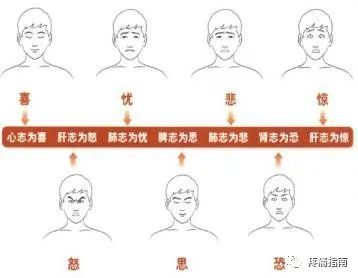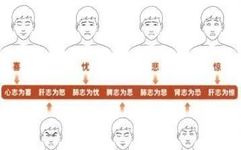
Click↑ Blue FollowUs!
(1) Basic Concept of the Seven Emotions
The Seven Emotions refer to the normal emotional activities of joy, anger, worry, thought, sadness, fear, and shock. They are the human mind’s response to external events. The Seven Emotions are closely related to the functions of the body’s organs. Each of the Seven Emotions corresponds to one of the Five Organs, represented by joy, anger, thought, sadness, and fear, collectively known as the Five Aspirations.

The Seven Emotions are different reflections of human responses to objective phenomena. Generally, within a normal range of activity, they do not cause illness. Only sudden, intense, or prolonged emotional stimuli that exceed the body’s normal physiological activity can disrupt the flow of Qi, leading to imbalances in the organs’ Yin, Yang, Qi, and blood, resulting in disease. Therefore, as a cause of illness, the Seven Emotions refer to excessively strong, prolonged, or sudden emotional changes that lead to imbalances in the organs’ Qi and blood, causing disease. Illness caused by the Seven Emotions is termed “Yin Yu Zhi Bing” (illness caused by emotional stagnation).
Chronic diseases can lead to long-term dysfunction of the organs, resulting in abnormal emotional states, known as “Yin Bing Zhi Yu” (emotional stagnation caused by illness). The Seven Emotions are also related to the body’s tolerance and regulatory capacity. The pathogenic effects of the Seven Emotions differ from the Six Excesses, which primarily invade the body through the mouth, nose, or skin, while the Seven Emotions directly affect the related organs. The Seven Emotions can not only trigger various diseases but also significantly influence the progression of diseases, promoting either improvement or deterioration. As one of the main pathogenic factors causing internal injury, they are also referred to as “Internal Injury from the Seven Emotions.”
(2) The Relationship Between the Seven Emotions and the Organs’ Qi and Blood
1. The Relationship Between the Seven Emotions and the Organs: The emotional activities of the human body are closely related to the organs. The basic principle is: the heart governs joy; excessive joy harms the heart; the liver governs anger; excessive anger harms the liver; the spleen governs thought; excessive thought harms the spleen; the lungs govern sadness and worry; excessive sadness and worry harm the lungs; the kidneys govern shock and fear; excessive shock and fear harm the kidneys. This indicates that organ pathologies can manifest as corresponding emotional responses, and excessive emotional responses can damage the related organs. The theory that the Seven Emotions arise from and harm the Five Organs has significant guiding implications in diagnosis and treatment.
2. The Relationship Between the Seven Emotions and Qi and Blood: Qi and blood are the two fundamental substances that constitute the body and sustain life activities. Qi warms and promotes the organs, while blood nourishes them. Qi and blood form the material basis for emotional activities, and there is a close relationship between emotional activities and Qi and blood. Changes in the organs’ Qi and blood can also affect emotional changes. Hence, it is said: “When blood is abundant, there is anger; when it is deficient, there is fear.” The physiological activities of the organs must be based on Qi and blood, while emotional activities are manifestations of the organs’ physiological functions, thus establishing a close relationship between emotional activities and the organs’ Qi and blood.

(3) Characteristics of Diseases Caused by the Seven Emotions
1. Related to Mental Stimuli: The Seven Emotions are considered mental pathogenic factors, and their onset is always associated with significant mental stimuli. Throughout the course of the illness, changes in emotions can lead to noticeable changes in the condition. For example, epilepsy is often caused by emotional injury; depression harms the liver, leading to liver Qi stagnation, which damages the spleen, resulting in poor digestion and the production of phlegm, which can ascend and disturb the mind, leading to loss of control. Mania is often caused by anger, sadness, and resentment, which harm the liver and gallbladder, leading to an inability to vent emotions, resulting in fire transformation, which consumes fluids and forms phlegm-fire, disturbing the heart and causing mental confusion. This illustrates the significant role of mental factors in the onset and progression of diseases.
2. Directly Injuring the Organs: Excessive Seven Emotions can affect the activities of the organs, leading to pathological changes. Different emotional stimuli can harm different organs, resulting in various pathological changes.
Moreover, emotional disturbances such as joy, anger, worry, thought, and fear can disrupt the Qi of the organs, leading to fire transformation, which manifests as irritability, anger, insomnia, flushed face, bitter mouth, and even symptoms like hematemesis and epistaxis, known as “Five Aspirations Transforming into Fire.” Emotional disturbances can also lead to “Six Stagnations” as a disease, where Qi stagnation leads to dampness, dampness leads to heat, heat leads to phlegm, phlegm stagnation leads to blood stasis, and blood stasis leads to food stagnation. In other words, Qi stagnation can lead to blood stagnation, phlegm stagnation, dampness stagnation, and food stagnation as diseases.
3. Affecting the Qi Mechanism of the Organs: “All diseases arise from Qi.” Joy, anger, worry, thought, sadness, fear, and shock are referred to as the Seven Qis, or Seven Emotions. Beyond the Seven Emotions, when combined with cold and heat, they are referred to as the Nine Qis. Qi is precious for its smooth flow and continuous movement; it rises and falls regularly. When Qi enters and exits in an orderly manner, and rises and falls normally, the body remains healthy. However, when the Seven Emotions fluctuate excessively, the Qi mechanism becomes disordered, leading to either Qi stagnation or abnormal rising and falling.
Emotional stagnation from the Seven Emotions can lead to Qi stagnation or abnormal rising and falling. When the Seven Emotions are not expressed, Qi becomes stagnant, leading to Qi stagnation and blood stasis, Qi stagnation leading to dampness and phlegm, and fire transformation harming Yin. This can manifest in the body or the organs, resulting in various diseases.
The damage from the Seven Emotions causes disordered Qi mechanisms in the organs, abnormal blood circulation, and imbalances in Yin and Yang. Different emotional changes manifest differently in terms of Qi mechanism disturbances. Anger causes Qi to rise, joy causes Qi to relax, sadness causes Qi to dissipate, thought causes Qi to stagnate, fear causes Qi to descend, and shock causes Qi to become chaotic.
Anger causes Qi to rise: Qi rising means Qi is reversing upwards. Anger is the aspiration of the liver. When faced with frustration or dissatisfaction, temporary anger generally does not cause illness. However, if one becomes violently angry, it can harm the liver, causing liver Qi to excessively disperse and rise, leading to illness. When liver Qi rises, blood follows, which can lead to symptoms such as dizziness, headache, flushed face, tinnitus, and in severe cases, hematemesis or fainting. Liver Qi can also affect the spleen, causing abdominal distension and diarrhea. Diarrhea, also known as water and grain diarrhea, presents as undigested stools. If it affects the stomach, symptoms like hiccups and vomiting may occur. Since the liver and kidneys share a source, anger can harm both the liver and kidneys. Kidney damage leads to symptoms like fear, forgetfulness, and weakness in the lower back.

Joy causes Qi to relax: Qi relaxation means the heart Qi is relaxed. Joy is the aspiration of the heart. It includes both the calming of tense emotions and the dispersal of heart Qi. Under normal circumstances, joy can ease tense emotions, leading to a pleasant mood and harmonious Qi and blood, indicating a healthy state. However, excessive joy can lead to heart disease. Violent joy harms the heart, causing heart Qi to disperse, leading to symptoms like fatigue, lethargy, lack of concentration, palpitations, confusion, and even mania.
Sadness causes Qi to dissipate: Qi dissipation means the lung Qi is consumed. Sadness and worry are the aspirations of the lungs. Sadness is a manifestation of emotional pain and sorrow. Excessive sadness often consumes lung Qi, affecting the heart, liver, and spleen. For example, it can weaken lung Qi, leading to symptoms like shortness of breath, chest tightness, and mental fatigue.
Sadness harms the liver, leading to mental confusion, and can even cause muscle spasms and discomfort in the ribs. Excessive sadness can also injure heart Qi, leading to palpitations and confusion. Sadness harms the spleen, leading to stagnation in the three burners, resulting in abdominal distension and weakness in the limbs.
Thought causes Qi to stagnate: Qi stagnation means spleen Qi is blocked. Thought is the aspiration of the spleen. Thinking is a normal physiological activity, but excessive thinking can lead to Qi stagnation in the middle burner, causing poor digestion and symptoms like abdominal distension and diarrhea, and even muscle wasting. Excessive thinking can harm the heart, leading to heart blood deficiency, which can cause palpitations, insomnia, forgetfulness, and vivid dreams.
Fear causes Qi to descend: Qi descent means the essence Qi is sinking. Fear is the aspiration of the kidneys. Fear is a psychological response of cowardice and dread. Prolonged fear or sudden fright can damage kidney Qi, known as “fear harms the kidneys.” Excessive fear can lead to kidney Qi instability, resulting in symptoms like incontinence and weakness. Fear harms the kidneys, leading to insufficient nourishment of the heart and lungs, resulting in symptoms like chest fullness, abdominal distension, and anxiety.
Shock causes Qi to become chaotic: Qi chaos refers to disordered heart Qi. The heart governs blood and houses the spirit; a great shock can disrupt heart Qi, leading to imbalances in Qi and blood, resulting in symptoms like palpitations, insomnia, irritability, and even mental confusion.
Shock differs from fear; self-awareness indicates fear, while shock is unawareness. Shock can disturb the heart and also harm the liver and gallbladder, leading to mental confusion or affecting the fetus, causing congenital epilepsy.
4. Emotional Fluctuations Can Alter Disease Conditions: Abnormal emotional fluctuations can exacerbate or rapidly worsen conditions, such as in patients with dizziness due to Yin deficiency and Yang excess. If they encounter anger, it can cause liver Yang to surge, leading to dizziness, fainting, or even sudden stroke.
This article is sourced from the internet; if there is any infringement, please contact us for removal!
Your likes are our motivation for progress!
↘↘↘

